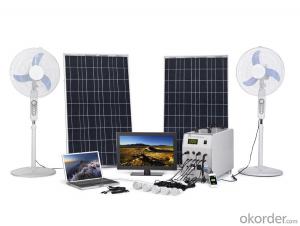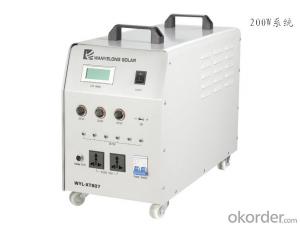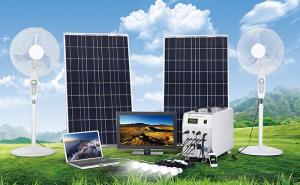Solar Power System - AC >200W Solar Power System
- Loading Port:
- Guangzhou
- Payment Terms:
- TT OR LC
- Min Order Qty:
- 20 set
- Supply Capability:
- 10000 set/month
OKorder Service Pledge
OKorder Financial Service
You Might Also Like
Light up 4-6 rooms at the same time,with mobile phone charge function,power DC fan,DC TV,Laptop,AC TV,Computer
●Installation,all-in-one DIY Kit;
●5m light cable-with on/off switch;
●Mobile phone charge-for different phones;
●Power Supply-solar or AC adapter;
●Protection-overcharge and over-discharge;
●Pure sine wave inverter built in.
Part | Specification | Qty | |
Solar panel | Poly crystallione type with 10m cable | 100W | ×1 |
Power box | Lead acid rechargeable battery | 55AH/12V | ×1 |
PWM charge controller | 10A/12V | ×1 | |
Pure sine wave inverter | 300W | ×1 | |
AC Output | 220V/110V 50/60Hz | ×1 | |
Cigarette lighter socket output | DC12V | ×2 | |
DC output port | 12V | ×4 | |
USB charge output | 5V | ×1 | |
Others | DC12V LED bulb | 3W | ×4 |
Light holder with 5m cable | On off switch | ×4 | |
USB charge cable | 10 in 1 | ×1 | |
Solar panel mounting bracket | Angle adjustable | ||
DC floor fan (not included) | 15W/12V | ×2 | |
DC TV (not included) | 15inch 30W12V | ×1 | |
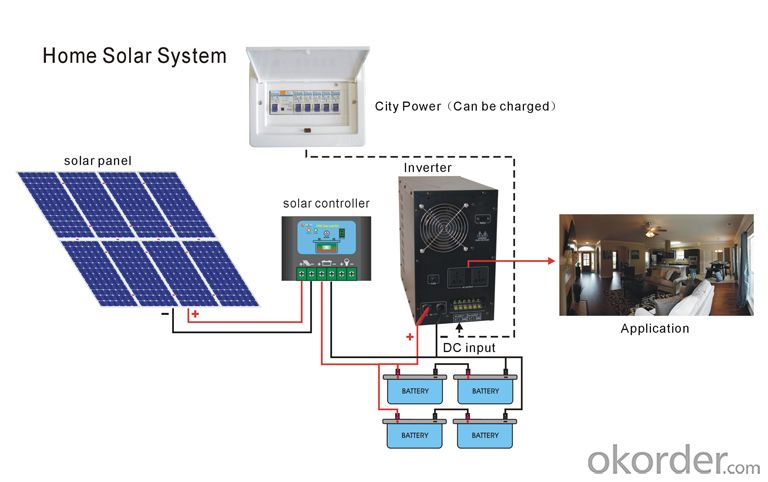
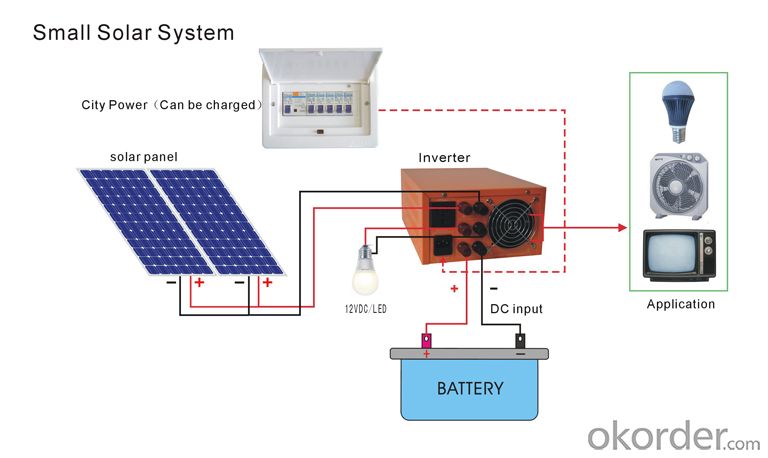
Quantuty
Quality goal:Constant innovation to meet the request of the customers. Protect the environment, provide environmental products to customer.
Quality strategy:
Quality: established high efficiency quality manager system in line with ISO9001 and ISO/TS16949.
Improvement: keeping improvement & quality guarantee.
Efficiency: delivery on time, complete the agreed events with the customers on time.
Service: focus on customers, provide the service and technology support on time.
FAQ
1. How long will my inquiry get response?
Your inquiry related to our products or prices will be replied within 24 hours.
2. Can I get professional service and suggestion?
Well-trained and experienced staffs to answer all your questions in fluent English.
3. Do you accept OEM or customized design?
OEM & ODM, any your customized lightings we can help you to design and put into product.
4. What if I need specific design?
Distributorship are offered for your unique design and some our current models.
- Q:How do solar energy systems contribute to reducing the risk of electrical fires compared to traditional power generation methods?
- Solar energy systems contribute to reducing the risk of electrical fires compared to traditional power generation methods in several ways. Firstly, solar panels generate electricity without the need for fuel combustion, eliminating the risk of fire caused by flammable materials. Additionally, solar energy systems typically have fewer electrical components and wiring connections, minimizing the potential for faulty connections or short circuits that can lead to fires. Furthermore, solar energy systems do not require long-distance transmission lines, reducing the chances of power surges or electrical faults that can trigger fires. Overall, the decentralized and clean nature of solar energy greatly reduces the risk of electrical fires, making it a safer alternative to traditional power generation methods.
- Q:What is solar tracking and how does it improve system efficiency?
- Solar tracking is a mechanism used in solar energy systems to orient solar panels towards the sun, maximizing their exposure to sunlight throughout the day. By continuously adjusting the position of the solar panels, solar tracking ensures that the panels are always perpendicular to the sun's rays, increasing the amount of solar energy captured. This improved alignment significantly enhances system efficiency as it allows for a higher solar energy input, resulting in increased electricity production and overall better performance of the solar energy system.
- Q:How does the efficiency of solar panels vary across different temperatures?
- Solar panel efficiency can vary depending on temperature due to the materials used in their construction. Typically, as temperature rises, the efficiency of solar panels decreases. This phenomenon is known as the temperature coefficient. The temperature coefficient measures how much a solar panel's efficiency decreases with every degree Celsius increase in temperature. Manufacturers provide different temperature coefficients for various types of solar panels. One of the main reasons for reduced efficiency at higher temperatures is the impact on semiconducting materials, like silicon, used in solar panels. These materials are sensitive to temperature changes and can experience increased resistance, resulting in less electricity generation from sunlight. Another factor affecting efficiency at higher temperatures is the decrease in open-circuit voltage, which is the maximum voltage obtained from a solar panel when no load is connected. As temperature rises, open-circuit voltage tends to decrease, affecting overall efficiency. It's important to note that the decrease in efficiency is not necessarily linear. At extremely high temperatures, the decrease may be more significant, while at moderately high temperatures, it may be relatively small. Manufacturers employ various design features to mitigate the impact of temperature on solar panel efficiency. These include using materials with lower temperature coefficients, incorporating cooling mechanisms like heat sinks or ventilation, and utilizing tracking systems to maximize sunlight exposure while minimizing temperature effects. In conclusion, while solar panels still generate electricity effectively at higher temperatures, it is crucial to consider the temperature coefficient and design features for optimal efficiency and performance.
- Q:What is the role of solar energy systems in reducing water usage?
- Solar energy systems play a significant role in reducing water usage by providing a sustainable and renewable source of power that reduces reliance on water-intensive energy sources like fossil fuels and nuclear power. Solar power does not require water for operation, unlike coal or gas-fired power plants that consume large amounts of water for cooling. By promoting the adoption of solar energy systems, we can effectively conserve water resources and contribute to a more sustainable future.
- Q:Can solar energy systems be used in powering beauty salons or spas?
- Certainly, beauty salons and spas can utilize solar energy systems to effectively power their establishments. Solar energy is a source of power that is both renewable and sustainable, enabling these establishments to decrease their reliance on traditional electricity and minimize their carbon footprint. Installation of solar panels on the rooftop or other suitable areas allows beauty salons and spas to generate their own electricity, resulting in long-term cost savings. Beauty salons and spas typically have high electricity requirements for operating various equipment such as hair dryers, hair straighteners, curling irons, lighting, and air conditioning. Solar energy systems are capable of meeting these power demands, particularly during daylight hours when the sun is shining. Any excess electricity generated during the day can be stored in batteries or directed back into the grid, ensuring a continuous and reliable power supply. Furthermore, by adopting solar power, beauty salons and spas can enhance their sustainability and environmental performance. This transition to solar energy enables these establishments to significantly reduce their carbon emissions and actively contribute to the global fight against climate change. Additionally, the use of solar energy can attract environmentally conscious customers who value businesses that prioritize sustainability. To summarize, solar energy systems present a viable solution for powering beauty salons and spas. They provide a dependable and sustainable source of electricity, while also offering cost savings and supporting greener and more environmentally friendly business practices.
- Q:Are there any risks of electrical shocks during installation or maintenance of solar energy systems?
- During the installation or maintenance of solar energy systems, one must be aware of the risks of electrical shocks. These systems involve working with electrical components, such as solar panels, inverters, and batteries, which carry high voltage. Failure to follow proper safety measures can result in contact with live electrical parts and the possibility of receiving an electrical shock. Several factors can contribute to the risk of electrical shocks, including improper installation, insufficient knowledge or training in electrical systems, failure to use personal protective equipment (PPE), and inadequate grounding. It is crucial to adhere to safety guidelines and regulations when installing or maintaining solar energy systems. This includes wearing insulated gloves, using insulated tools, and ensuring proper grounding. Furthermore, working at heights during installation or maintenance introduces an additional hazard of electrical shocks. Care must be taken to prevent falls or accidental contact with live electrical parts while working on rooftops or elevated areas. To minimize the risks of electrical shocks, it is advisable to hire qualified and trained professionals for the installation and maintenance of solar energy systems. Regular inspections and maintenance checks should also be conducted to identify and address any potential electrical hazards. In conclusion, while solar energy systems offer many benefits, it is vital to be aware of the potential risks of electrical shocks and take the necessary precautions to ensure the safety of individuals involved in the installation or maintenance process.
- Q:Can solar energy systems be installed on parking lots or carports?
- Yes, solar energy systems can be installed on parking lots or carports. In fact, these locations can provide ample space for solar panels to be installed and generate clean energy. Solar carports are increasingly popular as they not only generate electricity but also provide shaded parking areas for vehicles. This innovative approach allows for the dual use of space, making it an efficient way to harness solar power while providing shelter for cars.
- Q:Can solar energy systems be used in areas with high levels of dust or sandstorms?
- Yes, solar energy systems can be used in areas with high levels of dust or sandstorms. While dust and sandstorms can temporarily reduce the efficiency of solar panels by blocking sunlight, there are several measures that can be taken to mitigate their impact. Firstly, regular cleaning and maintenance of solar panels can help to remove accumulated dust and debris, ensuring maximum sunlight absorption. This can be done manually or through automated cleaning systems that use water or brushes to keep the panels clean. Secondly, advanced panel designs and coatings are available that can minimize the adhesion of dust particles and facilitate easy cleaning. These technologies can help panels to self-clean or reduce the accumulation of dust, ensuring optimal performance even in dusty environments. Additionally, proper installation and positioning of solar panels can also play a significant role in reducing the impact of dust or sandstorms. By tilting the panels at an appropriate angle and maintaining a sufficient ground clearance, the accumulation of dust can be minimized. Furthermore, the use of protective measures such as fences, windbreakers, or enclosures around the solar energy systems can help shield the panels from strong winds and blowing sand during sandstorms. These measures can help prevent physical damage to the panels and maintain their functionality. In conclusion, while dust or sandstorms can pose temporary challenges to solar energy systems, with proper maintenance, cleaning, panel design, positioning, and protective measures, solar energy can still be effectively harnessed in areas with high levels of dust or sandstorms.
- Q:Can solar energy systems be used for powering off-grid sustainable communities?
- Yes, solar energy systems can be used to power off-grid sustainable communities. Solar panels can generate electricity from sunlight, which can be stored in batteries for later use. This renewable energy source is clean, abundant, and can be harnessed in remote areas where grid access is limited. By relying on solar power, off-grid sustainable communities can reduce their reliance on fossil fuels, lower their carbon footprint, and achieve long-term energy independence.
- Q:Can solar energy systems be used for powering electric vehicle sharing programs?
- Yes, solar energy systems can be used to power electric vehicle sharing programs. Solar energy is a renewable and sustainable source of power, making it an ideal solution for reducing carbon emissions and promoting clean transportation. By installing solar panels and utilizing the energy they produce, electric vehicle sharing programs can operate on clean and green energy. This eliminates the reliance on fossil fuels and reduces the overall environmental impact of the program. Additionally, solar energy systems can provide a reliable and cost-effective source of power for charging electric vehicles, making it an efficient and practical solution for powering these programs.
1. Manufacturer Overview |
|
|---|---|
| Location | |
| Year Established | |
| Annual Output Value | |
| Main Markets | |
| Company Certifications | |
2. Manufacturer Certificates |
|
|---|---|
| a) Certification Name | |
| Range | |
| Reference | |
| Validity Period | |
3. Manufacturer Capability |
|
|---|---|
| a)Trade Capacity | |
| Nearest Port | |
| Export Percentage | |
| No.of Employees in Trade Department | |
| Language Spoken: | |
| b)Factory Information | |
| Factory Size: | |
| No. of Production Lines | |
| Contract Manufacturing | |
| Product Price Range | |
Send your message to us
Solar Power System - AC >200W Solar Power System
- Loading Port:
- Guangzhou
- Payment Terms:
- TT OR LC
- Min Order Qty:
- 20 set
- Supply Capability:
- 10000 set/month
OKorder Service Pledge
OKorder Financial Service
Similar products
New products
Hot products
Related keywords
